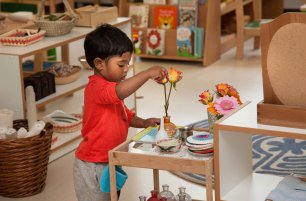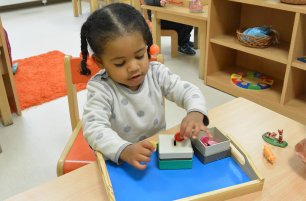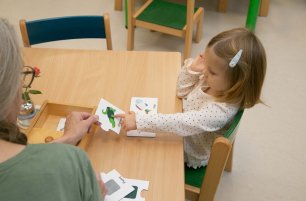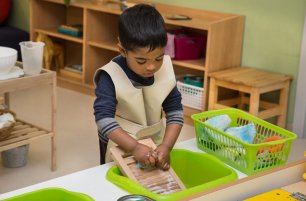Forest Exploration with Toddlers
At IMSP we are fortunate enough to have access to a forest right on our doorstep. This offers invaluable opportunities for our toddlers to explore the natural world with the support of their guides. Interaction with the natural environment provides mental and physical health benefits for children and adults alike and allows children to be inspired by the world around them, away from their usual home or classroom environments.
Of course, the first step to any exploration of the outdoors is preparing ourselves! Each time we visit the forest is an opportunity to discuss the weather of the day and how we will dress and behave in response to that weather. For example, we can ask the children how we must dress in the rain or remind them to drink lots of water because the day is hot. Toddlers are encouraged to dress themselves as much as they are able, ideally with just a few verbal cues from their guides. We can ask where they have put their raincoat, or to show us how they put on their boots. This allows the toddler to start their forest adventure in a prepared and mindful way, which encourages independence and the development of motor skills.
Once in the forest, children whose curiosity and energy calls them to run ahead are allowed to do so under the supervision of our staff, while other students can hang back and enjoy the peace of the forest at a slower pace. Guides will lead all children through the forest, closely monitoring the front, back, and centre of the group. The forest is a naturally inspiring environment for a growing child, which provides opportunities for creativity, learning, mindfulness, and of course exercise!

As guides we can lead children into active games to move their bodies or encourage them to simply experience the forest around them with their senses. Toddlers are guided into touching trees, leaves, and moss with their hands to experience the textures of the forest. They can also be encouraged to be still and listen for the sounds of birds, insects and the other creatures living around them. With the progression of the seasons, we can track how the forest changes. We can monitor how leaves grow, change color and are dropped. We can point out freshly growing flowers and the activity of insects. At the toddler stage, we can start teaching children basic nature identification skills through simple pattern recognition. For example, we may challenge a toddler to find three leaves of the same kind, for example from an oak tree. We show them what makes these particular leaves unique and name the tree they came from. In this way the toddler can expand their vocabulary for understanding the natural world around them. The toddler children can also start to create artwork from the natural materials of the forest. Building small fairy houses or artworks from sticks and leaves allows young children to leave their mark on the forest, without harming the natural environment. Forest walks allow children to exercise their minds and bodies in an exciting, ever-changing environment. The opportunity for regular time spent outdoors will hopefully be the start of a lifelong love and respect for nature in our toddler students.
Maya Lucas
Want to learn more? Read our next article:




